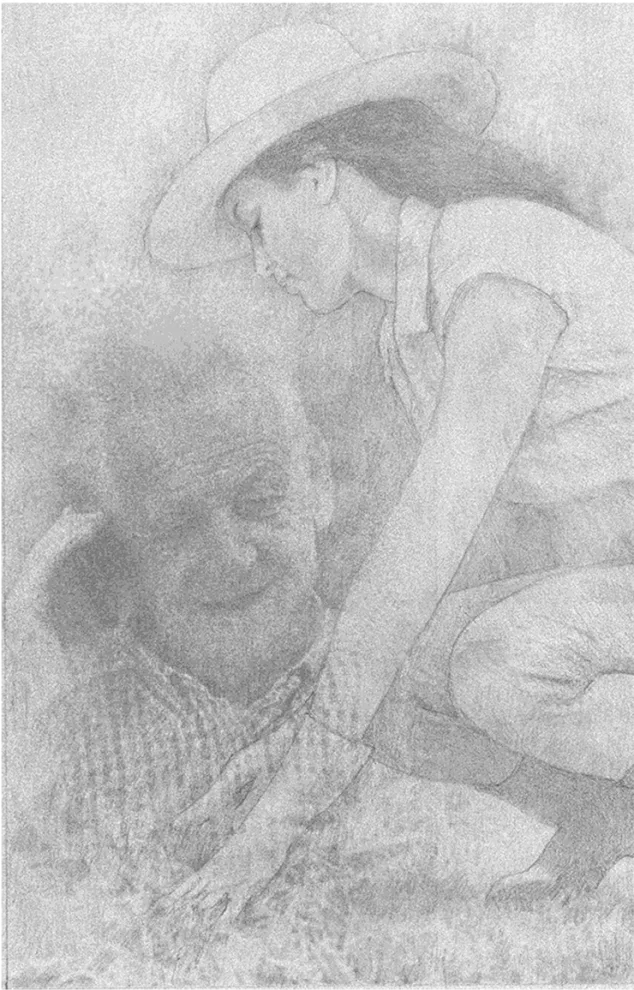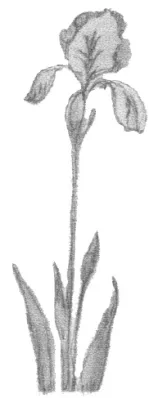I’ve never been much of a gardener. Nor were my mother and father. My grandmother gardened, though. I especially remember her iris. Rows upon rows of iris sprang to life at Gram’s house every year. Shades of purple dotted the landscape as I darted through the trails amongst the buds. She talked to them, too, softly mumbling words I could never quite make out.
But me, I’ve never been much of a gardener. My poor husband has to keep our houseplants. I kill virtually every plant I touch.
One day, out of the blue, my Dad told me on the phone, “I have cancer.”
“You what?!”
At first I rallied behind him as we began treatments and attempted to qualify for new trials. But two years of fighting make even the strongest people tired. Eventually, I was left almost ignoring Dad’s cancer, like the proverbial elephant in the room. It simply sat there, stifling the air.
It changed me, though. I became tired, irritated, and sad. Dad lived in Texas, we were in Colorado—thousands of miles separated me from his fight. What could I do?
My mother-in-law told me gardening might help me deal with my stress. I laughed, knowing how I’d cause garden genocide.
“Really,” she urged, “you’d be surprised how it clears your mind. It gives you something to put your hands on, something you can help.”
We were sitting on her patio, enjoying one of those amazing, sparkling Colorado fall days. She’d been preparing her garden for the long winter—she’d even hung a sign that read “Closed For Season. Reason, Freezing.’” But I could recall its beauty as we basked in the sun.

“You know I’d just kill any poor plant I bought, right?” I laughed.
“Sometimes it’s the reason we plant that helps, not our skill.” She’s the Yoda of mother-in-laws.
“OK,” I conceded, “what do you think I should plant?”
“Didn’t you say your grandmother grew iris?”
And that was how I undertook my first garden. In truth, it was just a few iris bulbs, but to me it became more.
I planted the bulbs in a back corner of our yard. Because of our dogs, I surrounded them with a tall cage. I would come home from teaching and—while my son, Gabe, played in the yard—remove the cage and talk to the bulbs.
At first I simply begged them to grow. As it grew colder, however, I began to talk more about my Dad than I did about them. “I don’t know what to say to him. What do you say that encourages someone trying not to die? I can’t change anything. I can’t even see him more than a few times a year. What good can I do?”
Sitting there one day, as skiffs of snow dotted the yard, I realized that my Gram probably spoke just like this to her garden while my grandfather was succumbing to cancer.
When winter set in and snow covered the yard, I got out of the habit of visiting my little corner.
Then spring came—and the day my son bounded into the house shouting, “Mommy, your friends are growing!”
It took me a bit to realize what he meant. Apparently he had noticed my conversations with the iris bed.
Sometimes kids say things that sound ludicrous to adults, but are absolutely true.
My friends were growing.
Gabe started joining me each afternoon and telling the grow-ing iris about his day. Before long, they were his friends, too.
When the first bloom opened, I couldn’t describe the joy I felt. I had managed to bring life to a plant. Five beautiful irises bloomed—a commonplace to a regular gardener, a miracle to me.
That fall I phoned my father for what I thought was another routine call.
“How are you feeling today, Daddy?”
“You know, I don’t think I’m going to be here that much longer.”
“What do you mean?” I stuttered, “Did a doctor say that?”
“That’s just how I feel,” he replied almost matter of factly.
I was angry. Was he giving up? Trying to get a big reaction? I lost my temper and yelled at him. After a few minutes, I calmed down—and apologized.
“There’s no data I can give you,” he told me. “I don’t know anything. I just feel like it’s about that time.”
“OK, Dad,” I muttered. “How about we come see you for fall break? It’s just in a few weeks.”
“That sounds good,” he replied.
But when I called again in a few days, things had changed.
“Gabe wants to tell you about his day,” I told Dad. My son loved to tell Dad every detail of his day.
“Who?” Dad asked.
I figured he hadn’t heard me. “Gabe.”
“I’ll listen, but who is that?”
Suddenly Dad was going through spells where nothing he said made sense. Our phone conversations became short. Mom had to fill in as she could.
Soon after, on a Friday, Mom called to say that if we wanted to see my dad alive again, we needed to come right away. My husband, son, and I flew to Texas the next morning. The next few days were spent moving Dad into hospice and watching him slowly drift away. When we left on Monday, he hadn’t opened his eyes in over a day. Everyone was simply waiting, glumly, for the end.
Tuesday night I got the call: Dad had slipped away. I no longer had a father to call and talk to as I drove home from school. My son wouldn’t get to hear the hundreds of historical stories that Dad loved to share. He simply wouldn’t be there.
Crying and cursing both, I threw on my robe, walked down the stairs, and went out into the yard. The grass crunched under my feet in the dark. I got on my knees beside my iris bed, dug my hands into the soil, and angrily yanked each bulb out of the ground. When I was done, I numbly walked back into the house, washed my hands, and climbed back into bed.
The next morning I had to tell Gabe that his granddad was gone. That was almost harder than hearing it in the first place.
“We should go see your friends,” he said. But I knew what we would find.
“They went to sleep for winter,” I said, ashamed. How could I tell him that the irises were dead, too—and I’d killed them?
After that, I never went back to that corner of the yard. I just tried to move on with life. I’m sure at some point Gabe went out and saw the carnage of my sadness, but he never said anything.
I grieved for my dad all winter long. Each day presented a new feeling, a new memory, a new challenge. Some days I felt like I couldn’t manage another step.
One day months later, after the snow had melted and the air warmed, Gabe bounded into the kitchen.
“Mommy! Your friend isn’t sleeping anymore!”
“What?”
“Come see! Your friend woke up.”
I followed his little feet out into the yard. As he knelt down in the corner, memories of my night months before flooded back, and my steps slowed.
“See?” he said happily.

One iris had managed to survive my grief. I stared in disbelief at the sprig of green poking out of the ground, pushing through the soil despite my betrayal.
That moment stays with me still today. That bulb, that glimpse of life and forgiveness that I needed so desperately, began my new start on life—and my new garden. These days I walk out to it from time to time and sit. I don’t say too much, but I do feel a sense of comfort. And of peace.
I’m still not much of a gardener. But no one seems to have told that to the iris. ❖
This article was published originally in 2016, in GreenPrints Issue #105.



